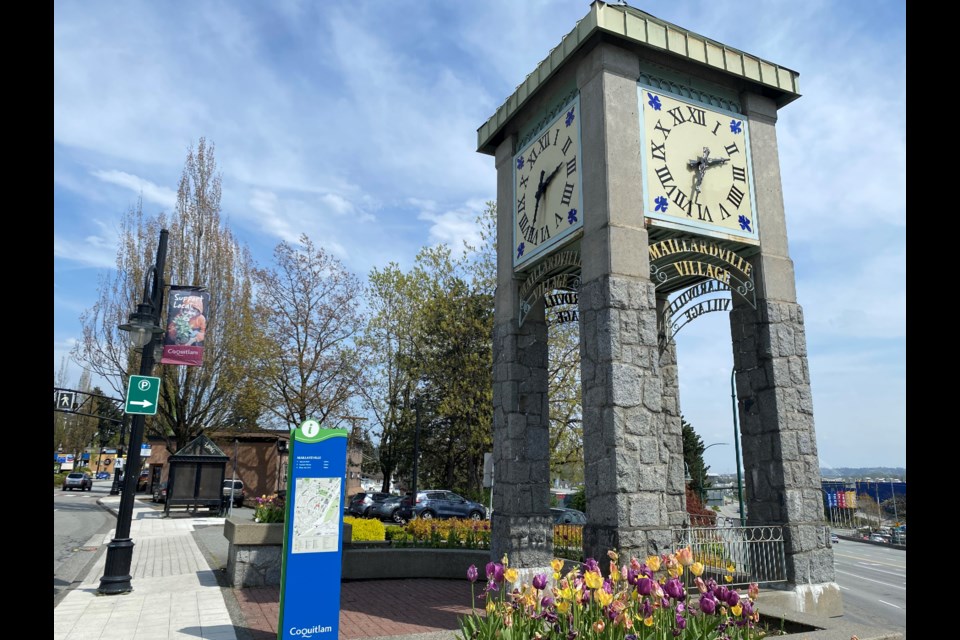The historic neighbourhood of Maillardville, located at an important crossroad between Burnaby and New Westminster, has long been Coquitlam's most prominent heritage community.
Located near a heavily trafficked corridor known as the Brunette interchange on Highway 1, Maillardville has retained its small town francophone charm thanks to a combination of street improvements, wayfinding, heritage preservation and French-inspired building design such as mansard roofs.
The area was named for Father Edmund Maillard, the community's first priest when Maillardvile got its start in 1910 as a francophone mill town.
Even today, Maillardville plays a large role in Coquitlam with Festival du Bois, Place des Arts and organizations championing its heritage.
But now Maillardville is about to be ejected from the federal Port Moody–Coquitlam riding and possibly linked with neighbouring municipalities for a new riding to be called New Westminster–Burnaby–Maillardville.
Justified by the B.C. commission for the once-every-10 years riding redistribution, the riding change is one of a number of tweaks to accommodate population growth; an earlier draft proposed splitting Port Coqutilam in two before backtracking.
However, the two MPs most affected with this most recent change — Port Moody–Coquitlam MP Bonita Zarrillo and New Westminster–Burnaby MP Peter Julian — oppose the move.
Julian disagrees with adding an extra city to the riding, noting that it doesn't reflect communities of interest.
Zarrillo takes an even stronger stronger stance, arguing that losing Maillardville would be like losing the "heart" of southwestern Coquitlam.
Her Austin Avenue constituency office would no longer be in the riding by 2024 if the redistribution goes ahead as planned.
As well, jettisoning Maillardville from Coquitlam would effectively exile the community from organizations and other ties with which it has had a long association, she told a federal hearing in mid-April.
Lack of consultation
She said the change was done without consultation, especially with the Kwikwetlem First Nation, whose two reservations would be in two different ridings.
More curiously, however, Zarrillo also questioned whether the name "Maillardville" should be included in the name of a federal riding.
With Canada at a time of reconciliation with Indigenous people, Zarrillo said using the name was "unconscionable" because Father Maillard, the community's namesake, worked at residential schools in B.C.
"To perpetuate this name, and to elevate this name in a new riding in 2023 when he was also a principal of a residential school in northern B.C., is unconscionable," Zarrillo told the commission.
When contacted by the Tri-City News, Zarrillo did not back down from her statement but expanded on her point.
"During this time of reconciliation, we should not be elevating that name based on the fact that we know that Father Maillard was a principal of a residential school and the history around that," she said.
However, she balked at getting rid of the name completely.
"I think there’s a conversation right now how we are handling the new learnings," she said.
"I’m not advocating the removal of names. I’m advocating that we don’t perpetuate without knowledge about those names."
Coquitlam research underway
Coquitlam's museum has already begun the research.
Coquitlam Heritage executive director Candrina Bailey said historians have found letters and other documents, such as a ferry manifest and a newspaper article, that confirm Father Maillard's ties to B.C. residential schools.
Information to be presented soon to the Coquitlam Heritage Society's board of directors suggests Father Maillard worked at St. Joseph’s Mission Residential School in Williams Lake for a number of years after he left Maillardville, as well as at Sechelt Indian Residential School, which has a history write-up in Canada's Centre for Truth and Reconciliation online archive.
No incidents involving Father Maillard are listed at the Sechelt school during his time.
As for St. Joseph's, an investigation into 93 unmarked graves was announced in early 2022.
But Bailey said the museum is in the early phase of its inquiry about Father Maillard's involvement in residential schools.
"We are committed to truth and reconciliation and we need to make sure if it was true [he worked at residential schools]. We didn’t ignore it," Bailey said.
Unfair accusations made
Johanne Dumas, executive and artistic director of the Société francophone de Maillardville, said she's surprised by MP Zarrillo's stand on not using the name Maillardville in the riding moniker.
Dumas told the Tri-City News she wrote a letter to the MP, siding with her in opposition to removing Maillardville from the Port Moody–Coquitlam riding.
But Dumas said she has "never heard a whisper" against Father Maillard in her 37 years with the francophone cultural organization.
"I have never heard anything so I can’t put accusations against someone just by making them guilty by association," said Dumas.
She said she's heard nothing but good things about the priest, including from former students who visited her from France during Maillardville's 100th anniversary.
Father Maillard moved to France and taught at a Canadian college, she said, and when the former students visited they were complimentary of the man.
"They all were unanimous at how nice that man was and how kind he was and how he shared his love and passion for Canada."
While she supports Zarrillo in keeping Maillardville in the Coquitlam riding, and admitted to being well aware of issues surrounding residential schools and their impact on indigenous people, Dumas said people shouldn't make assumptions without facts.
"I haven't heard anything," Dumas said.




